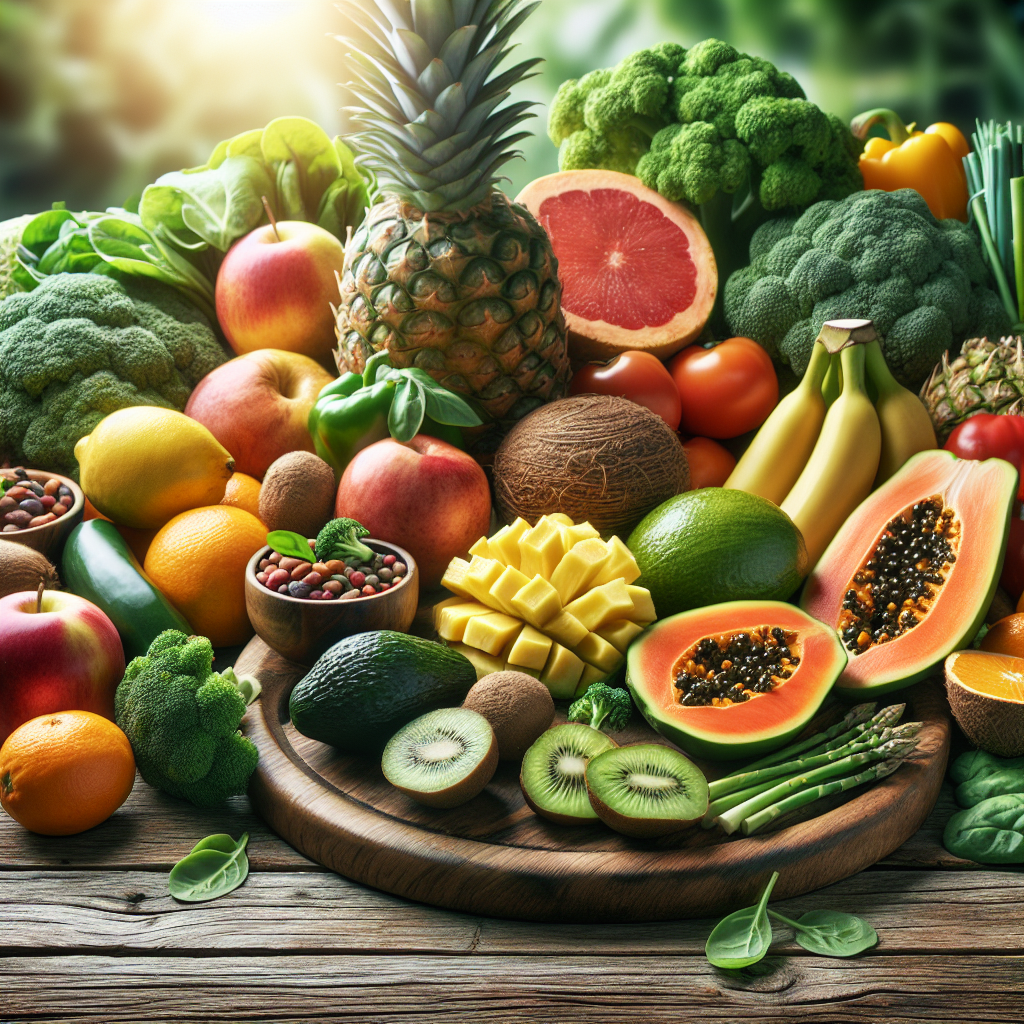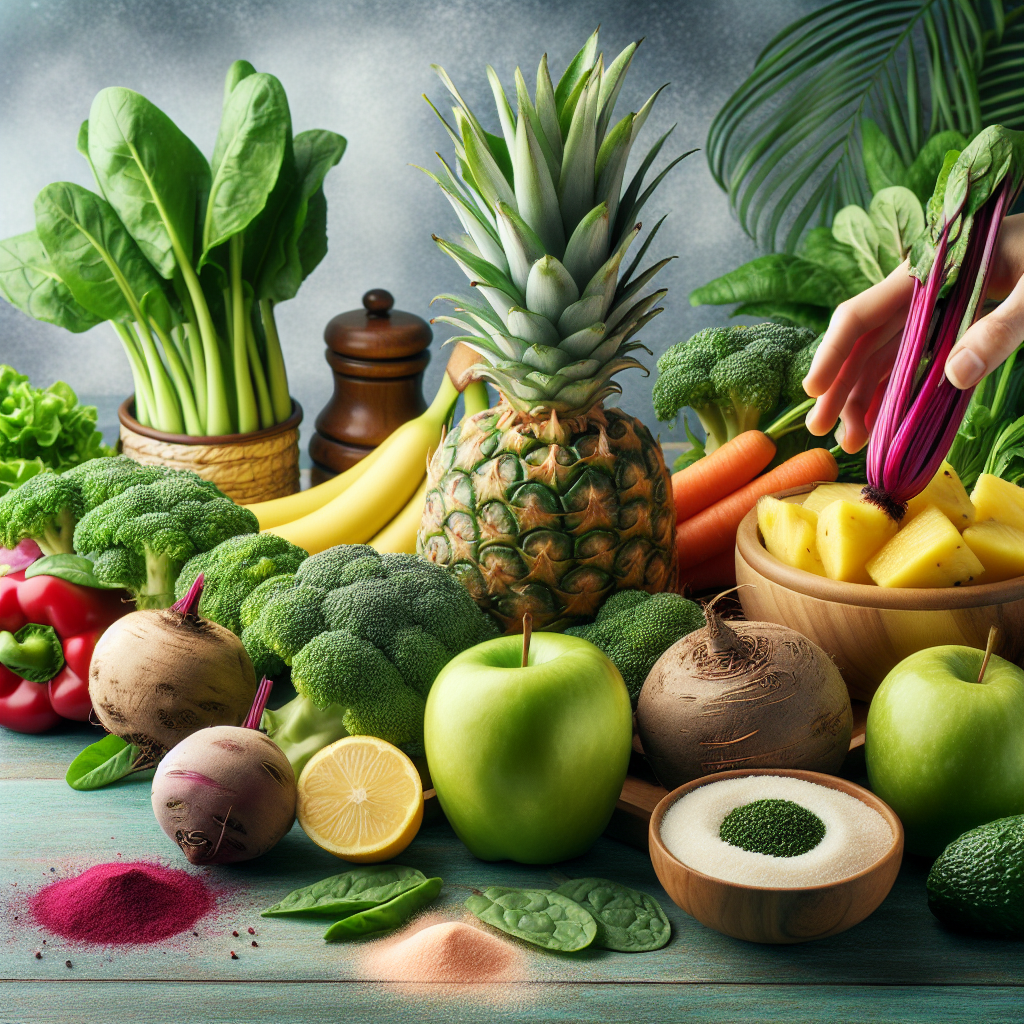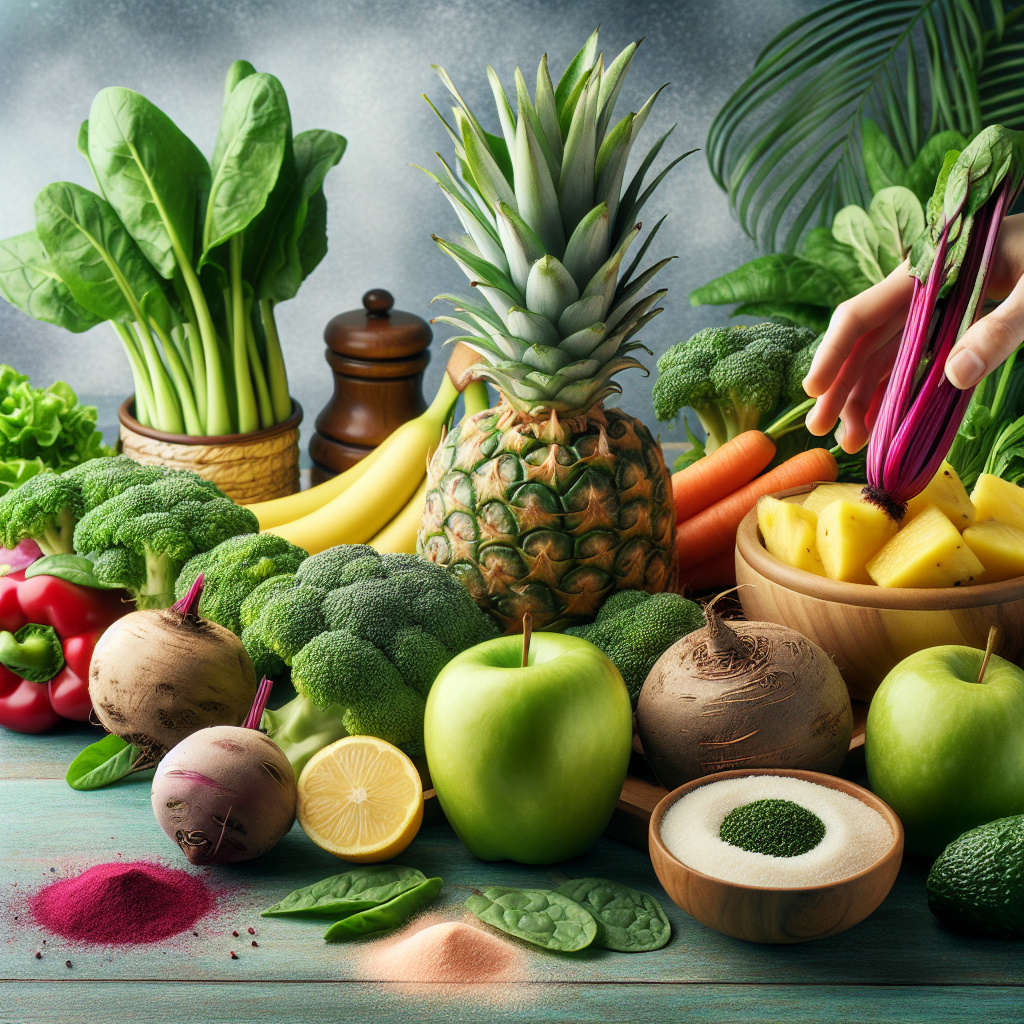Are you tired of dealing with digestive disorders that seem to disrupt your daily life? Look no further! In this article, we will explore the incredible benefits of incorporating fruits and vegetables into your diet to effectively manage and alleviate digestive disorders. From soothing inflammation to promoting healthy gut bacteria, these natural powerhouses are here to save the day and bring harmony back to your digestive system. Say goodbye to discomfort and hello to a thriving digestive system with the help of Mother Nature’s bounty!
Benefits of Fruits and Vegetables for Digestive Disorders
Digestive disorders can cause discomfort and disrupt your daily life. Thankfully, incorporating fruits and vegetables into your diet can have a positive impact on your digestive health. Here are some key benefits of consuming fruits and vegetables for digestive disorders.
Rich in Fiber
Fruits and vegetables are excellent sources of dietary fiber, which is essential for maintaining a healthy digestive system. Fiber adds bulk to your stool, making it easier to pass through the intestines and preventing constipation. It also helps regulate bowel movements and promotes regularity. By including fiber-rich fruits and vegetables in your diet, you can alleviate symptoms of digestive disorders and improve overall gut health.
Source of Essential Nutrients
Fruits and vegetables are packed with essential vitamins, minerals, and antioxidants that are crucial for a well-functioning digestive system. These nutrients support the growth of beneficial gut bacteria, strengthen the intestinal lining, and aid in the absorption of nutrients. Incorporating a variety of colorful fruits and vegetables into your meals ensures that you are getting a wide range of nutrients, promoting optimal digestive health.
Helpful in Maintaining Gut Health
The health of your gut is paramount to good digestion. Fruits and vegetables play a crucial role in maintaining a healthy gut. Certain fruits and vegetables contain prebiotic fibers that act as food for the beneficial bacteria in your gut. By nourishing these friendly bacteria, fruits and vegetables contribute to a balanced gut microbiome, which is essential for proper digestion and overall well-being.
Natural Remedies for Constipation
Constipation is a common digestive disorder that can be both uncomfortable and frustrating. Fruits and vegetables are natural remedies for constipation due to their high fiber content. Berries, pears, prunes, apples, and broccoli are particularly effective in relieving constipation. These fibrous foods add bulk to the stool, soften it, and promote regular bowel movements, making it easier to pass waste and alleviate constipation symptoms.
Assisting in Digestion
Certain fruits and vegetables contain enzymes that aid in digestion. For example, papayas and pineapples contain enzymes called papain and bromelain, respectively, which assist in breaking down proteins and improving digestion. Ginger is another beneficial fruit that can alleviate digestive discomfort, as it helps relieve symptoms of indigestion and nausea. By incorporating these fruits and vegetables into your diet, you can support and enhance your digestion process.
Reducing Inflammation
Inflammation in the digestive system can contribute to various digestive disorders. Fortunately, many fruits and vegetables possess anti-inflammatory properties that can help reduce inflammation in the gut. Leafy greens, such as spinach and kale, are rich in antioxidants and phytochemicals that combat inflammation. By consuming these anti-inflammatory fruits and vegetables, you can promote a healthy digestive system and reduce the risk of developing chronic digestive disorders.
Common Digestive Disorders
Digestive disorders can manifest in various forms, affecting different parts of the digestive system. Some of the most common digestive disorders include:
Acid Reflux
Acid reflux, also known as gastroesophageal reflux disease (GERD), occurs when stomach acid flows back into the esophagus, causing heartburn and discomfort. Certain fruits and vegetables can help alleviate the symptoms of acid reflux and promote better digestive health.
Constipation
Constipation refers to infrequent bowel movements and difficulty passing stool. It can cause discomfort, bloating, and abdominal pain. Including specific fruits and vegetables in your diet can help relieve constipation symptoms and improve bowel regularity.
Irritable Bowel Syndrome (IBS)
IBS is a chronic digestive disorder characterized by abdominal pain, bloating, and changes in bowel habits. While the exact cause of IBS is unknown, certain fruits and vegetables can help manage the symptoms and provide relief for individuals with this condition.
Gastritis
Gastritis is the inflammation of the stomach lining, which can cause pain, nausea, and indigestion. Avoiding certain trigger foods and incorporating specific fruits and vegetables into your diet can help soothe the inflamed stomach lining and alleviate gastritis symptoms.
Diverticulitis
Diverticulitis occurs when small pouches in the digestive tract become inflamed or infected. This condition can cause abdominal pain, fever, and changes in bowel habits. A diet rich in fiber from fruits and vegetables can help prevent diverticulitis and alleviate its symptoms.

Fruits and Vegetables for Acid Reflux
If you suffer from acid reflux, incorporating certain fruits and vegetables into your diet can help alleviate symptoms and promote better digestive health. Consider including the following fruits and vegetables in your acid reflux-friendly meals:
Bananas:
Bananas are a great choice for individuals with acid reflux. They are low in acid and high in fiber, which can help neutralize stomach acid and promote healthy digestion.
Papayas:
Papayas contain an enzyme called papain, which aids in the digestion of proteins. This enzyme can help prevent the reflux of stomach acid and reduce acid reflux symptoms.
Melons:
Melons, such as watermelon and cantaloupe, are low in acid and high in water content. They can help soothe the esophagus and provide relief from acid reflux symptoms.
Ginger:
Ginger is a natural remedy for various digestive issues, including acid reflux. It has anti-inflammatory properties that can help reduce inflammation in the esophagus and alleviate acid reflux symptoms.
Leafy Greens:
Leafy greens, such as spinach and kale, are excellent options for individuals with acid reflux. They are low in acid and high in fiber, supporting a healthy digestive system and reducing the risk of acid reflux.
By including these acid reflux-friendly fruits and vegetables in your meals, you can minimize discomfort and promote better digestive health.
Fruits and Vegetables for Constipation
If you are struggling with constipation, incorporating specific fruits and vegetables into your diet can provide natural relief. These fiber-rich foods can help soften the stool and promote regular bowel movements. Consider adding the following fruits and vegetables to your meals to combat constipation:
Berries:
Berries, such as raspberries, blackberries, and strawberries, are high in fiber and can help alleviate constipation symptoms. They add bulk to the stool and promote regularity.
Pears:
Pears are an excellent source of fiber, both soluble and insoluble. They help regulate bowel movements, soften the stool, and relieve constipation.
Prunes:
Prunes are well-known for their natural laxative properties. They contain soluble and insoluble fiber, sorbitol, and natural sugars that help promote bowel regularity and combat constipation effectively.
Apples:
Apples are a great source of fiber, particularly pectin, a soluble fiber that aids in bowel movements. Including apples in your diet can help alleviate constipation symptoms.
Broccoli:
Broccoli is a fiber-rich vegetable that promotes healthy digestion and relieves constipation. It contains both soluble and insoluble fiber, making it an excellent choice for combating constipation.
By incorporating these fruits and vegetables into your diet, you can promote healthy bowel movements and relieve constipation naturally.

Fruits and Vegetables for Irritable Bowel Syndrome (IBS)
Individuals with irritable bowel syndrome (IBS) often experience abdominal pain, bloating, and changes in bowel habits. Certain fruits and vegetables can help manage these symptoms and provide relief. Consider including the following options in your IBS-friendly meals:
Avocados:
Avocados are low in fermentable carbohydrates, known as FODMAPs, which can trigger IBS symptoms. They provide healthy fats and are gentle on the digestive system, making them suitable for individuals with IBS.
Kiwi:
Kiwi is a low FODMAP fruit that contains a unique combination of fiber and enzymes. It can promote regular bowel movements and reduce IBS symptoms such as constipation.
Oranges:
Oranges are a good source of vitamin C and fiber. However, individuals with IBS should consume them in moderation due to their higher FODMAP content. It is essential to monitor your body’s response to oranges and adjust your intake accordingly.
Zucchini:
Zucchini is a low FODMAP vegetable that is gentle on the digestive system. It provides fiber and nutrients without triggering IBS symptoms. Incorporating zucchini into your meals can help alleviate bloating and discomfort.
Carrots:
Carrots are a low FODMAP vegetable that can provide essential nutrients and fiber without aggravating IBS symptoms. They are versatile and can be easily incorporated into various dishes.
By including these IBS-friendly fruits and vegetables in your diet, you can better manage your symptoms and promote a healthier digestive system.
Fruits and Vegetables for Gastritis
Gastritis, the inflammation of the stomach lining, can cause discomfort and disrupt normal digestion. Choosing the right fruits and vegetables can help soothe the inflamed stomach lining and alleviate gastritis symptoms. Consider incorporating the following options into your gastritis-friendly meals:
Applesauce:
Applesauce is easy to digest and can provide relief to individuals with gastritis. It is gentle on the stomach and can help soothe inflammation. Opt for unsweetened varieties to minimize added sugars.
Cabbage:
Cabbage is rich in antioxidants and has anti-inflammatory properties that can help reduce gastritis symptoms. Incorporating cabbage into your meals, such as in salads or stir-fries, can support a healthier stomach lining.
Celery:
Celery contains compounds that have been shown to have a protective effect on the stomach lining. It can help reduce inflammation and alleviate gastritis symptoms. Enjoy celery sticks as a snack or add them to soups and stir-fries.
Bananas:
Bananas are easy to digest and can provide relief to individuals with gastritis. They help neutralize stomach acid and can help soothe the stomach lining.
Potatoes:
Potatoes, particularly when boiled or mashed, are gentle on the stomach and can help provide relief from gastritis symptoms. Opt for simple preparations without added spices or oils.
Including these gastritis-friendly fruits and vegetables in your diet can help support a healthier stomach lining and alleviate discomfort.

Fruits and Vegetables for Diverticulitis
Diverticulitis occurs when small pouches in the digestive tract become inflamed or infected. A diet rich in fiber is essential for preventing diverticulitis and promoting overall digestive health. Include the following fruits and vegetables in your diet to prevent and manage diverticulitis:
Beets:
Beets are a great source of fiber, which supports regular bowel movements and helps prevent diverticulitis. They can be enjoyed roasted, steamed, or added to salads for added nutritional benefits.
Squash:
Squash, such as butternut squash or acorn squash, is high in fiber and gentle on the digestive system. It can help prevent diverticulitis and alleviate its symptoms.
Peppers:
Peppers, particularly bell peppers, are rich in fiber and can help promote bowel regularity. They can be enjoyed raw in salads or cooked in stir-fries and other dishes.
Cucumbers:
Cucumbers are hydrating and contain fiber, making them a beneficial addition to the diet for individuals at risk of diverticulitis. They can be enjoyed raw or added to refreshing salads.
Blueberries:
Blueberries are an excellent source of antioxidants and dietary fiber. They can help support a healthy digestive system and reduce the risk of developing diverticulitis.
By incorporating these fiber-rich fruits and vegetables into your diet, you can help prevent and manage diverticulitis, promoting a healthier digestive system.
Tips for Incorporating Fruits and Vegetables into Your Diet
Now that you understand the benefits of fruits and vegetables for digestive disorders, here are some helpful tips for incorporating them into your diet:
Start Slowly:
If you are new to consuming fruits and vegetables or have a sensitive digestive system, start by introducing small amounts into your diet and gradually increase your intake. This allows your body to adjust and prevents any potential digestive discomfort.
Choose the Right Types:
Not all fruits and vegetables are suitable for everyone, especially those with existing digestive disorders. Pay attention to your body’s response to different types of fruits and vegetables and choose those that do not trigger your symptoms.
Cooking Methods:
Experiment with different cooking methods to find what works best for you. Some individuals with digestive disorders find that steaming or lightly sautéing their fruits and vegetables makes them easier to digest.
Include a Variety:
To ensure you are getting a wide range of nutrients, aim to include a variety of fruits and vegetables in your diet. Different fruits and vegetables offer unique health benefits, so mixing them up can promote optimal digestive health.
Consider Smoothies:
If you have difficulty consuming whole fruits and vegetables, consider incorporating them into smoothies. Smoothies can be a convenient way to consume a variety of fruits and vegetables and can be easily customized to suit your preferences and dietary needs.
By following these tips, you can seamlessly incorporate fruits and vegetables into your diet and reap their digestive health benefits.

Precautions and Considerations
While fruits and vegetables offer numerous benefits for digestive disorders, it is essential to keep the following precautions and considerations in mind:
Food Allergies:
Some individuals may have allergies or intolerances to certain fruits and vegetables. If you notice any adverse reactions after consuming a particular fruit or vegetable, consult a healthcare professional to determine if it is related to an allergy or intolerance.
Individual Tolerance:
Each person’s digestive system is unique, and certain fruits and vegetables may not be well-tolerated. Pay attention to your body’s response to different foods and adjust your diet accordingly for optimal digestive health.
Consulting with a Healthcare Professional:
If you have a pre-existing digestive disorder or any concerns regarding your digestive health, it is always advisable to consult with a healthcare professional. They can provide personalized advice and guidance tailored to your specific needs.
Monitoring Symptoms:
While fruits and vegetables are generally beneficial for digestive health, it is important to monitor your symptoms and adjust your diet as needed. If you notice any worsening of symptoms or changes in your digestive health, consult a healthcare professional for further evaluation.
Balancing Diet:
While fruits and vegetables are an essential part of a healthy diet, it is important to maintain a balanced diet that includes other food groups as well. Incorporate lean proteins, whole grains, and healthy fats to ensure you are getting a well-rounded and nourishing diet.
By taking these precautions and considerations into account, you can safely and effectively manage your digestive disorders with fruits and vegetables.
Conclusion
Fruits and vegetables offer numerous benefits for managing digestive disorders naturally. Their rich fiber content, essential nutrients, and digestive-aiding properties make them an integral part of a healthy and balanced diet. From alleviating symptoms of acid reflux and constipation to managing conditions like IBS, gastritis, and diverticulitis, fruits and vegetables play a crucial role in maintaining optimal digestive health.
Remember to choose fruits and vegetables that are well-tolerated by your body and consult with a healthcare professional if you have any concerns or pre-existing digestive disorders. By incorporating a variety of colorful fruits and vegetables into your meals, you can enjoy a delicious, nourishing, and gut-friendly diet that supports your overall well-being. So, why wait? Start reaping the benefits of fruits and vegetables for your digestive health today!


